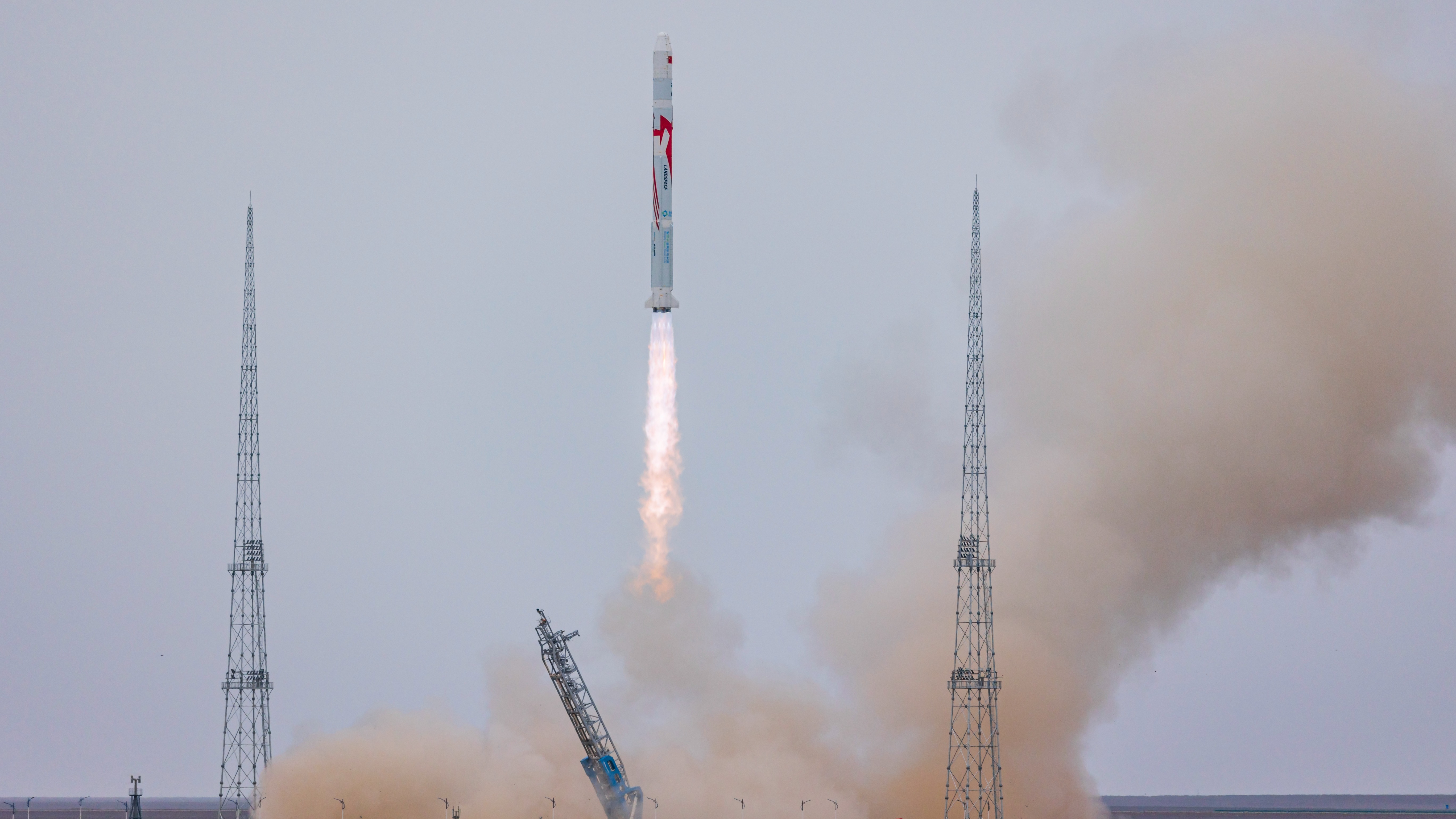China just launched a methane-fueled rocket into orbit, a world's 1st for spaceflight (video)
Zhuque-2 is the first 'methalox' rocket to successfully reach Earth orbit.
A methane-fueled rocket just reached Earth orbit for the first time ever.
The Zhuque-2 rocket, developed by Chinese company Landspace, successfully soared to orbit after launching from the Jiuquan Satellite Launch Center in the Gobi Desert on Tuesday (July 11) at 9 p.m. EDT (0100 GMT or 9 a.m. local time on July 12).
U.S. Space Force tracking confirmed Chinese reports that the methane-fueled rocket made it to orbit, tweeted astrophysicist and satellite tracker Jonathan McDowell.
It was a milestone effort for Zhuque-2, which suffered an anomaly during its debut flight on Dec. 14, 2022. Beijing-based Landspace issued a statement shortly thereafter confirming that the second stage of the rocket was lost (along with a clutch of satellites) and that an investigation would ensue to find the cause, which has not yet been released.
Related: The environmental impact of rocket launches: The 'dirty' and the 'green'
Methane, aside from burning with a pretty blue color during launch, has been billed by advocates as being more environmentally friendly. While methane is a greenhouse gas, it is cleaner than the standard RP-1 (kerosene) used in many rockets.
Zhuque-2's colorful plume caught a lot of attention on Twitter.
Breaking space news, the latest updates on rocket launches, skywatching events and more!
📸Wow! Close-up look at Zhuque-2 Y2 launch. Nice shot of the methane CH4 flame. Credit: LandSpace, @byspto pic.twitter.com/rVBOMHXfn6July 12, 2023
😮Wow! Such a unique angle to watch a rocket launch. Bird view of Zhuque-2 Y2 methane rocket launch shot by a drone right above the launch pad. Full HD: https://t.co/fACfZOvEO0 https://t.co/FdgI1NMo6O pic.twitter.com/Pz3oSlBLGFJuly 12, 2023
📸Photos of Zhuque-2 Y2 launch today. Source: https://t.co/VQrkixB4Hh pic.twitter.com/5aNFWsgFIzJuly 12, 2023
More neat photos of LANDSPACE's Zhuque-2 Y2 https://t.co/ICqbkaqfKs https://t.co/JmHbcJS27X pic.twitter.com/CVpSiw4cmhJuly 12, 2023
Many U.S. companies are working on methane-fueled rockets as well, including SpaceX with its Starship system, Blue Origin with New Glenn, Rocket Lab with Neutron, United Launch Alliance with Vulcan Centaur and Relativity Space with its Terran line. Some of these vehicles have suffered issues in recent months, however.
Terran 1 failed to reach orbit on its debut launch in March, for example, and SpaceX issued a self-destruct command to Starship during its first fully stacked launch in April after the vehicle suffered several anomalies. (SpaceX is developing Starship to help settle Mars, and methane fuel can be sourced on the Red Planet, company founder and CEO Elon Musk has stressed.)
Vulcan Centaur was supposed to fly for the first time in early May, but that liftoff has been delayed after an anomaly occurred during testing of the rocket's upper stage.
Blue Origin's New Glenn development is also uncertain following reports Tuesday (July 11) that one of the company's BE-4 rocket engines exploded during testing in late June.
The BE-4 engine not only powers New Glenn, but also the first stage of Vulcan Centaur. More information about impacts to the two vehicles may come during an already-scheduled phone call with reporters Thursday (July 13) by ULA CEO and President Tory Bruno concerning progress of his company's rocket.
China and its private space companies have been on a tear in terms of launches, taking 54 missions to orbit in 2022 and targeting more than 60 in 2023. By comparison, SpaceX (by far the busiest U.S. launcher) launched 61 rockets to space in 2022.

Elizabeth Howell (she/her), Ph.D., was a staff writer in the spaceflight channel between 2022 and 2024 specializing in Canadian space news. She was contributing writer for Space.com for 10 years from 2012 to 2024. Elizabeth's reporting includes multiple exclusives with the White House, leading world coverage about a lost-and-found space tomato on the International Space Station, witnessing five human spaceflight launches on two continents, flying parabolic, working inside a spacesuit, and participating in a simulated Mars mission. Her latest book, "Why Am I Taller?" (ECW Press, 2022) is co-written with astronaut Dave Williams.

